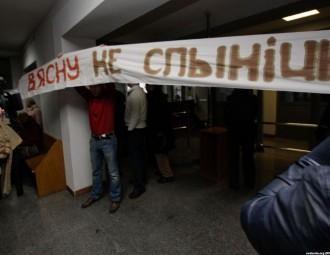Valiantsin Stefanovich: It is a threat to all the members of HRC “Viasna”

“We believe that the decision of the Prosecutor General’s Office is a threat to all the members of the HRC “Viasna” and another attempt to intimidate activists of all non-governmental organizations”.
Such an assessment of the Prosecutor General’s Office’s reply, which concerns the introduction of the website spring96.org in the list of resources with restricted assess, was given by the Deputy Chairman of the Human Rights Center "Viasna".
The reply argues that Viasna’s website was blacklisted by a decision of the Prosecutor General’s Office in August 2011 on the grounds that “actions on behalf of the human rights organization "Viasna", that has not passed the established procedures of state registration, are contrary to the legislation of the Republic of Belarus.” The Prosecutor General’s Office also stresses that organizing or participating in the activities of organizations that have not passed in the prescribed manner the state registration procedure is punishable by criminal liability under Article 193.1 of the Criminal Code.
Valiantsin Stefanovich, Deputy Chairman of the Human Rights Center "Viasna", commented on the situation in the interview with the EuroBelarus Information Service.
- First of all, I wanted to receive an official reply that the website spring96.org was really included in the list of resources with restricted assess. All my previous attempts brought no results; everyone claimed there is no information concerning it.
We believe this reply to be a threat at all the members of the HRC “Viasna”, as the letter notes that the activity on behalf of an unregistered organization is criminally liable under Article 193.1 of the Criminal Code.
In this regard we have adopted a statement, which says that the activities of the Human Rights Center "Viasna" in Belarus are completely legitimate.
As to the criminal liability for the organization's activities without state registration provided by Art. 193.1 of the Criminal Code, it has unconstitutional nature and lacks conformity with international standards of human rights. A respective assessment of Art. 193.1 of the Criminal Code was also given by an expert legal opinion of the European Commission for Democracy through Law (Venice Commission of the Council of Europe).
- Do you concede that the Prosecutor General’s Office can move from threats to real actions?
- As the Article 193.1 is retained in the Criminal Code, we can expect anything from the authorities. How they would use this law depends on the political expedience and the authorities’ will. All members of NGOs are under the threat of becoming criminally liable. Public prosecution bodies have more than once been warned for the activity on behalf of an unregistered organization.
Thus, any of us can become criminally liable at any moment.
- What will be your official reaction to the decision of the Prosecutor General’s Office besides the statement?
- We are going to appeal the decision in court. All the more that the Ministry of Communications provides with such right if the website is put on the list of resources with restricted assess.
-
03.01
-
07.10
-
22.09
-
17.08
-
12.08
-
30.09



























